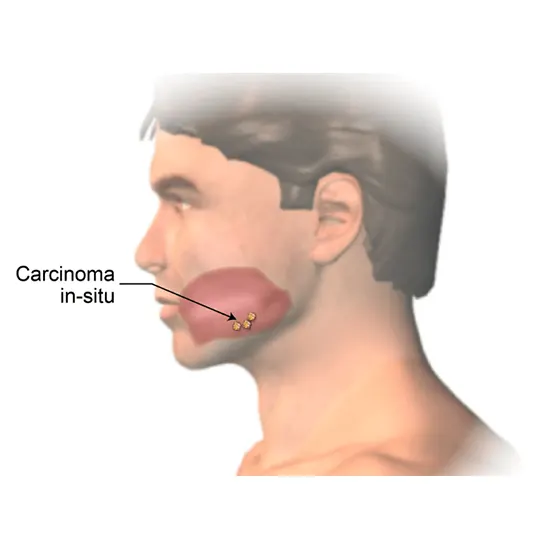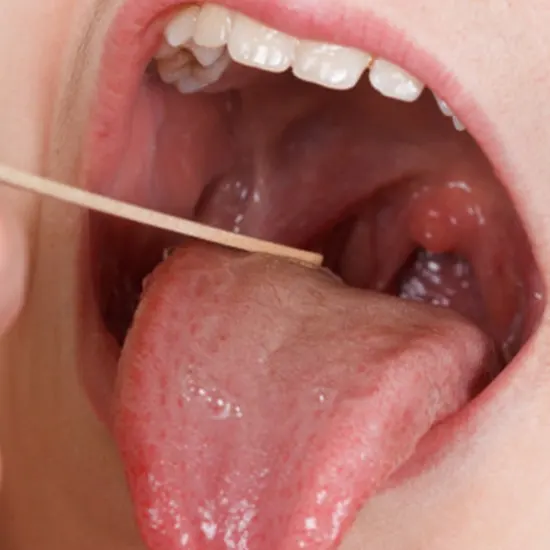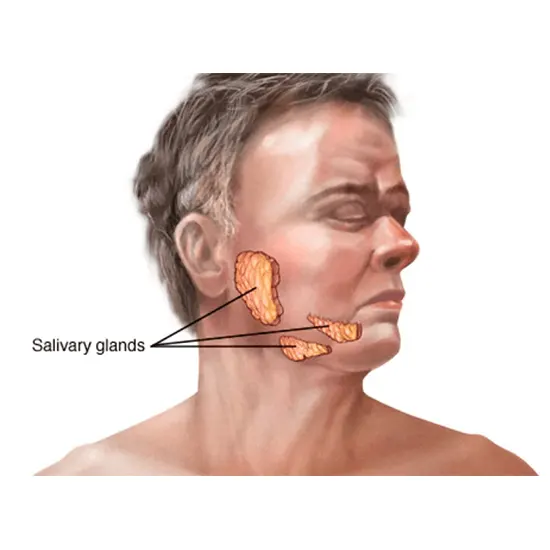
Mouth cancer, also known as oral cavity cancer or oral cancer, is a type of cancer that develops in the tissues of the mouth, lips, tongue, or throat. It is typically classified as head and neck cancer. The condition is...
Mouth cancer, also known as oral cavity cancer or oral cancer, is a type of cancer that develops in the tissues of the mouth, lips, tongue, or throat. It is typically classified as head and neck cancer. The condition is characterized by the uncontrolled growth of abnormal cells that can invade and destroy healthy tissues in the affected area. Research says that In India, oral cancer accounts for 30% of all cancer. Globally, India ranks second for having the highest number of mouth cancer patients. Because it is a preventable disease so it can be prevented with effective preventive measures and treatment.
About Mouth Cancer
Mouth cancer, also known as oral cancer, refers to cancer that develops in any part of the mouth, including the lips, tongue, gums, cheeks, roof, or floor of the mouth. The stages of mouth cancer are determined by the extent of the cancerous cells' spread within the mouth and to nearby tissues.

Types of mouth cancer
Mouth cancer is of 4 types
- Squamous cell carcinoma
- Verrucous carcinoma
- Adenocarcinoma
- Mucoepidermoid carcinoma
Squamous cell carcinoma: This is the most common type of mouth cancer, and it typically begins in the squamous cells that line the inside of the mouth, lips, and tongue.
Verrucous carcinoma: This is a less common type of mouth cancer that typically grows slowly and does not spread as quickly as other types.
Adenocarcinoma: This type of cancer begins in the salivary glands, which are located inside the mouth and throat.
Mucoepidermoid carcinoma: This is a rare type of cancer that begins in the salivary glands.
Stages of mouth cancer
The cancer of mouth has 5 stages such as:
Stage 0: This is the earliest stage of mouth cancer, also known as carcinoma in situ. The cancer cells are present only in the top layer of cells in the affected area and have not spread to nearby tissues.
Stage I: At this stage, the cancer is still localized to the original site and is smaller than 2 centimeters.
Stage II: Cancer has grown larger than 2 centimeters but is still localized to the original site.
Stage III: Cancer has spread to nearby lymph nodes, or it has grown into nearby tissues, such as the jawbone.
Stage IV: This stage has two sub-stages:
- Stage IVA: Cancer has spread to nearby structures, such as the lymph nodes, the bones of the jaw, or the skin of the face.
- Stage IVB: Cancer has spread to distant parts of the body, such as the lungs or liver.
Symptoms of mouth cancer
The symptoms of mouth cancer can vary depending on the location and severity of the cancer. The most common symptoms of mouth cancer include persistent sores or ulcers in the mouth, difficulty or pain when swallowing, persistent hoarseness or sore throat, and lumps or swelling in the mouth or neck. Other signs may include numbness in the mouth or lips, loose teeth, or changes in speech.

The common symptoms of mouth cancer are:
- A sore or ulcer in the mouth that does not heal or persists for more than two weeks.
- A lump or thickening in the mouth, throat, or neck.
- Persistent pain in the mouth, throat, or ear.
- Difficulty or pain when swallowing.
- Changes in the color or texture of the mouth tissues, including white or red patches.
- Numbness in the mouth or tongue.
- Difficulty moving the tongue or jaw.
- Loose teeth or difficulty with denture fit.
- Persistent bad breath.
- Changes in speech or difficulty speaking.
It's important to note that these symptoms can also be caused by other conditions, such as infections or injuries. However, if you experience any of these symptoms and they persist for more than two weeks, it's important to see a doctor or dentist for evaluation. Early detection and treatment of mouth cancer can significantly improve the chances of successful treatment and recovery.
Causes of mouth cancer
Several risk factors can increase the likelihood of developing the condition. Some common causes and risk factors for mouth cancer include:
- Tobacco use: Smoking cigarettes, cigars, pipes, or using smokeless tobacco products like chewing tobacco or snuff can significantly increase the risk of developing mouth cancer.
- Heavy alcohol consumption: Drinking alcohol regularly and in large quantities can also increase the risk of mouth cancer, especially when combined with tobacco use.
- Human papillomavirus (HPV) infection: Certain types of HPV, especially HPV-16, and HPV-18, are associated with an increased risk of mouth cancer.
- Poor oral hygiene: Neglecting dental care and failing to maintain good oral hygiene can increase the risk of developing mouth cancer.
- Chronic irritation: Prolonged exposure to irritants such as rough teeth, ill-fitting dentures, or constant chewing of tobacco or betel nut can increase the risk of developing mouth cancer.
- Sun exposure: Excessive exposure to the sun increases the risk of cancer of lips.
- Genetics: In some cases, mouth cancer may be linked to inherited genetic mutations that can increase the risk of developing the condition.
- Age: Mouth cancer is common among people of the age group of 50 years or more.
- Gender: Men are more likely than women to develop mouth cancer.
- Diet: A diet low in fruits and vegetables may increase the risk of developing mouth cancer.
- Weakened immune system: People with weakened immune systems, such as those with HIV/AIDS or those who have undergone an organ transplant, may be at increased risk of developing mouth cancer.
It's important to note that not everyone who develops mouth cancer has one or more of these risk factors. Conversely, not everyone with these risk factors will develop the condition. However, by taking steps to reduce these risk factors, individuals can lower their overall risk of developing mouth cancer.
Benefits of early detection of mouth cancer
Early detection of mouth cancer can offer many benefits, including:
Increased chance of successful treatment: The earlier mouth cancer is detected, the more likely it is to be treated successfully. Treatment is often less invasive and has a highly successful when the cancer is caught in its early stages.
More treatment options: Early detection of mouth cancer provides more treatment options. When the cancer is caught early, surgery or radiation therapy may be the only treatment required. However, as cancer progresses, more aggressive treatments may be necessary, such as chemotherapy.
Reduced risk of complications: Early detection can help reduce the risk of complications
Associated with mouth cancer, such as difficulty speaking, eating, swallowing, or disfigurement.
Improved quality of life: Early detection and treatment of mouth cancer can help improve the quality of life for patients by reducing pain, discomfort, and other symptoms associated with the disease.
Lower healthcare costs: Early detection of mouth cancer can lead to lower healthcare costs since less invasive treatment options are generally less expensive than more aggressive therapies required in later stages.
It is essential to maintain regular dental check-ups and oral cancer screenings to catch any potential issues early. Any symptoms, such as mouth sores, pain or discomfort, difficulty swallowing or chewing, or changes in your voice or speech, should be evaluated by a medical professional as soon as possible.
Diagnosis of Mouth Cancer
Not all abnormalities or growths in the mouth are cancerous, but it's crucial to get them checked out by a doctor. The earlier mouth cancer is detected, the better the chances for successful treatment. If your doctor suspects you may have mouth cancer, they may order one or more of the following diagnostic tests:

Physical examination: During a physical examination, your doctor will examine your mouth, tongue, throat, and neck for any signs of abnormalities or cancerous growth.
Biopsy: A biopsy involves removing a small piece of tissue from the affected area and examining it under a microscope to determine if cancer cells are present. This is the most definitive way to diagnose mouth cancer.
Endoscopy: An endoscopy involves the use of a thin, flexible tube with a camera on the end to examine the inside of the mouth, throat, and esophagus for any abnormalities or cancerous growths.
Imaging tests: Imaging tests such as X-rays, CT scans, or MRI scans may be ordered to determine the extent of cancer, whether it has spread to other parts of the body, and to plan for treatment.
X-Ray : X-rays can be used to determine whether cancer has spread to the jaw and other body parts. It detects some forms of mouth cancers, such as bone involvement or metastases.
CT Scan : A CT scan or computed tomography scan, can be a useful tool for diagnosing oral cancer. It produces detailed images of the structures within the mouth and can help detect the presence of a tumor or abnormal growth. CT scans are often used in conjunction with other diagnostic tools such as biopsies to confirm the diagnosis of mouth cancer. This scanning methodology can be used to monitor the disease progression as well as the effectiveness of treatment.
MRI Scan : An MRI (Magnetic resonance imaging) scan can also be used to diagnose and monitor oral cancer. MRI uses a strong powerful magnetic field, radio waves, and computer technology to create detailed images of soft tissues within the mouth and surrounding structure. MRI scans can be a useful diagnostic tool for oral cancer. It provides detailed information about the size, location, and extent of tumors in the mouth and it can help guide treatment decisions. This scan can monitor the effectiveness of treatment and detect any recurrence.
PET scan : A PET scan is a specialized imaging test that uses a small amount of radioactive material to produce detailed images of the inside of the body. It can help determine the extent of cancer and whether it has spread to other parts of the body.
Conclusion
The earlier the stage of mouth cancer is detected, the more effective the treatment will be. It is essential to see a doctor if you experience any symptoms, such as mouth sores, pain or discomfort, difficulty swallowing or chewing, or changes in your voice or speech.
Diagnosis of mouth cancer typically involves a physical examination of the mouth and throat, as well as imaging tests such as X-rays, CT scans, or MRI scans. A biopsy may also be performed, in which a small sample of tissue is removed from the affected area and examined under a microscope for signs of cancer. Treatment for mouth cancer may include surgery to remove the affected tissue, radiation therapy, chemotherapy, or a combination of these approaches. The treatment plan for mouth cancer depends on the cancer type, its stages as well as the overall health and preferences of patient.
It is important to seek medical attention if you experience any symptoms of mouth cancer or have any risk factors for the condition. Early detection and treatment can improve the chances of successful treatment and recovery.









